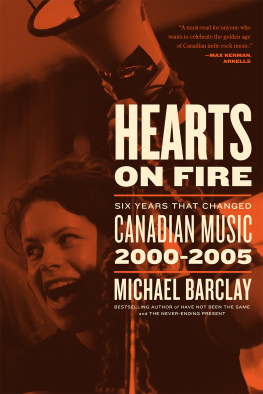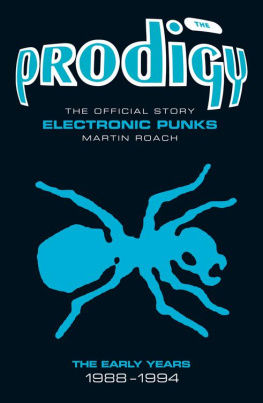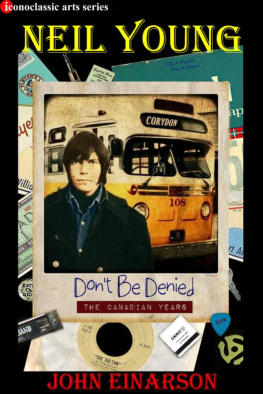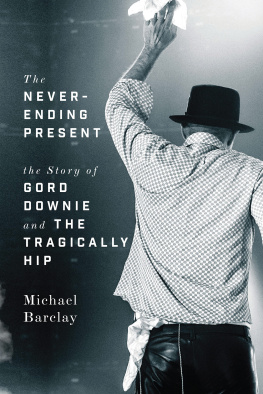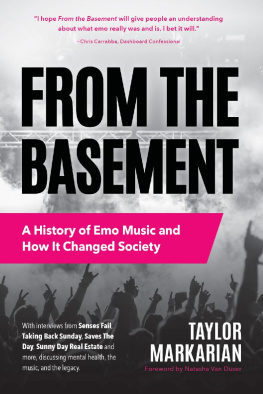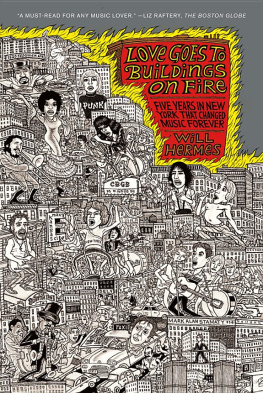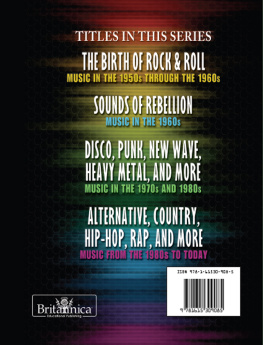Introduction
Get In or Get Out
This book was originally going to be about the entire first decade of the new century. Ten is a nice round number. This books predecessor, Have Not Been the Same, covered a decade. But this time I soon realized I had way too much to talk about, and most of the really important moments happened in the first half of a decade; the six following years were a continuation, not as transformative.
Part of the central thesis here is that the years 2000 to 2005 are when the rest of the world actually gave a shit about Canadian music: not just our somewhat random chart-toppers, but the groundswell of creativity that was happening en masse at the time, in many genres of music, using many different metrics of success. Evolving technology and media helped facilitate this in ways old models could not.
I grew up in alternative culture and have a degree in Canadian history. Therefore Ive always thought external validation is nice but by no means necessary: if the music made around the corner moves you, it is therefore importantwhether or not the rest of the country or the rest of the world hears it. Its a tired truism that Canadian media often ignores its artists until they get covered in the U.S. or U.K. Its been true for as long as Canada has been a country. Every arts writer has used that hook to pitch stories to reluctant Canadian editors, shaming them into playing catch-up. We rarely celebrate our own until someone else celebrates them first. Thats a national embarrassment.
And yet this book is primarily about those who broke through borders. In another era, that would just mean the superstarsyou know who they are. This time period, however, was when weirdos and innovators were more likely to break internationally than anyone aiming for commercial radio.
Applying an international filter to my thesis was one easy way to further narrow my focusand frankly, people outside Canada might now actually read this book. That meant excluding many of my favourite artists, some of my friends and likely many of yours, too. But youre holding this book right now: Can you imagine it being longer? Me neither. Im well aware whos missing from this book; Im sure Ill be hearing about it. Dont assume its because Im not a fan: sometimes thats true; often it isnt. Buy me a drink and Ill tell you the reasonsand give you a list of 50 other great Canadian records from this time period that arent found in these pages.
Every review of this book will quibble about whos in and whos out. Every musician who put out records during this time period is going to jump to the index. to see how many times theyre mentioned, if they are at all. Readers across the country will complain it has too much Toronto. Readers in Toronto will complain theres not enough. Residents of every province and every metropolis will feel underrepresented. Thats the story of Canadian history. Because Canada is not a thing. Any attempt to represent Canada will be an abject failure. Thats the story of this book as well.
There are so many stories about this period of time, inside and outside these pages, that could be spun into books of their own. I want to read them. I encourage you to write themand to take this book for what it is, not what it isnt.
Now, dive in. These are deep waters.
Spoiler: there isnt one, so download your free e-book that comes with your purchase, and do your own search.
Chapter 1
Visualize Success
That Night in Toronto
This book began on December 14, 2001. Toronto was blanketed in the first heavy snowfall of the year: the warm, insulating kind that makes the city look beautiful, the kind that makes the coming winter feel welcome. The band Royal City was headlining Lees Palace for the first time, to launch their second album, Alone at the Microphone, on Three Gut Records. Also on the bill was a brand new act called the Hidden Cameras, an unruly orchestra that looked like a group of queer camp counsellors, with underwear-clad go-go dancers, playing perfect 50s-style pop melodies set to four-on-the-floor disco thumps and violins.
It was one of the most beautiful nights of music Id ever seen in my life. The Hidden Cameras were a complete surprise; though I had a few friends in the band, that was my virgin experience. Royal City was not a surprise. Id played on a solo record by bandleader Aaron Riches, who in turn had played drums in my band when we needed a fill-in. Royal City drummer Nathan Lawr was a former roommate. That week Id given Alone at the Microphone a five-star review in Eye Weekly. Nepotism? Sure. But if I hadnt written that review, someone else would have: the album was a critical favourite across the country that year and still gets mentioned as a classic of the era. It was on an entirely different level from other records that happened to be made by friends in my musical orbit.
It eventually got Royal City a record deal with the U.K.s Rough Trade Records, with the man whod signed both the Smiths and, more recently, the Strokes; the label signed the Hidden Cameras at the same time. The idea of either signing seemed ridiculous on that cold December night.
When the show was over, I lingered at the bar. I ran into Stuart Berman, my editor at Eye Weekly, and we shared our rave reactions. Mark my words, he said. This is the start of something. In a couple of years, everyone will be talking about Toronto.
I was highly skeptical. Two months earlier, in the same venue, had been the launch party for a book I co-wrote, Have Not Been the Same. That book was about Canadian music between 1985 and 95 that was beloved at home but, with some notable exceptions, barely registered anywhere else. Tales of Canuck underachievement had been hammered into me to the point that I believed, just like one of my favourite (non-Canadian) songs of 2001 said, Mediocrity rules, man.
I dont want to burst your bubble, I told Berman, but the rest of the world doesnt give a shit about Canada, no matter how good our music is. People care more about indie music from New Zealand or Iceland than they ever will about Canada. Canada will never be cool.
In 2001, I believed the Nickelbacks of the world would likely be our greatest export, not the Royal Cities. Not the Hidden Cameras. Not the Feists. Not any other genre of music, either, especially not our hip-hop.
That night, Royal City covered Iggy Pops Success. I should have listened. I should have known. Another Three Gut act had already warned me.
Nine months earlier, I first heard the Constantines. I was living in Guelph and had just finished co-writing Have Not Been the Same; Id barely left the house in a year. The week before, Berman had written about them with the most hyperbolic prose Id ever read. Before I knew it, my friends at Three Gut Records had signed them. It turned out that one of the greatest new Canadian bands was living literally around the corner from me, 100 metres away, and Id been too suffocated by history to even notice.
That weekend I went to see them play. The show was in a bright grad lounge on the fifth floor of Guelphs University Centre, a building akin to a shopping mall with office space. It was the most unappealing venue possible, a benefit show for some loosely knit campus club of some kind, which meant that most people were there to talk disinterestedly to colleagues and chain-smoke. (You could still do that indoors then.)

